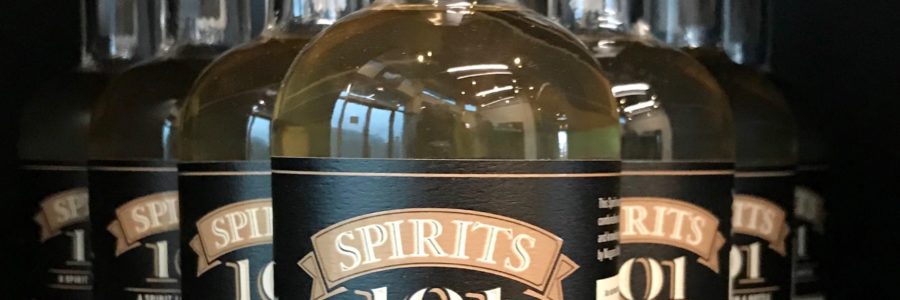Niagara College’s Spirits 101 lineup got a little more advanced this month with the addition of four new student-distilled creations.
The latest releases are capstone projects by students finishing their second term in the year-long Artisan Distilling program and include:
- Ambrosia, a honey-based spirit distilled similar to rum using honey from the College’s Commercial Beekeeping program;
- Agav-Eh, a spicy tequila-inspired distillation using blue agave;
- Tropical Heat, a balanced, sugar-based ferment made with a mix of molasses and evaporated sugar cane juice. It was blended with tropical fruit juices and finished with a serrano and Scotch bonnet pepper extraction; and
- Smoked Heritage, a grain spirit similar to smoked whisky that’s made with rye, dark crystal and maple smoked malts that’s finished with sherry-infused oak chips.
The four new spirits, made in small batches, demonstrate how far students in the program have come in a short time, said David Dickson, head distiller.
“They go from very little distilling experience to learning the ropes and starting their capstone projects in their second term,” Dickson said. “By the end of the semester, they have something on par with a premium artisanal product, which is where we want to be.”
Each spirit came with its own unique production challenges, Dickson noted, particularly the Ambrosia and Agav-Eh. Both honey and agave are antimicrobial, making the fermentation process difficult.
In the case of the Agav-Eh, students Anne Kilpatrick and Manda Men Ling Cheng pored over research papers with Dickson to determine they would need to pump air every day during fermentation to overcome agave’s antimicrobial nature and create the best environment for the yeast to work its magic.
“It’s probably been the hardest thing I’ve had to ferment but it allowed for a lot of learning opportunities,” Dickson said. “Sometimes you don’t know what you need to learn until you encounter roadblocks.”
Still, Kilpatrick was keen to take on the challenge because she wanted to create something that she enjoys drinking and that doesn’t require a lot of mixing to be quaffable. The double-distilled spirit has “a creamy, peppery texture and taste” and was briefly aged on two different wood chips with four levels of toast to give it colour and a kiss of wood flavour.
Kilpatrick compared the result to reposado, a tequila that’s briefly aged in oak.
“For two women of a certain age, who had no experience, we picked something tricky. It turned out great in the end. The final product ended up really beautiful,” Kilpatrick said. “Until I took this course, I never realized tequila was something you could sip. It’s beautiful and smooth.”
Naming Ambrosia, which means food or drink of the gods, was also a challenge because there are so few spirits like it, Dickson explained. The honey spirit has a flavour like rum with floral notes. It was back-sweetened with more honey to create mouthfeel and accentuate those floral characteristics.
Ambrosia would also have never been possible without the contributions of the Commercial Beekeeping program.
“Having that on-campus program allows us to do this because honey is expensive. It’s really cool. Of all the projects that tie in the NC culture, this is the one,” he said.
Finding a balance of sensations was the trick with Tropical Heat, where the heat from the hot pepper extraction shines through but doesn’t dominate. In the end, students came up with a drinkable liqueur “with a touch of heat without a strong flavour from the peppers” and a first for Spirits 101.
“This is approachable because it’s sweeter. Sometimes spirits aren’t approachable to the average person,” Dickson explained. “We also haven’t had a fruit-forward liqueur before, which makes it unique.
The new spirits, along with staples from the School Spirits line, are available for sale online at ncteachingwinery.ca, and are available for curbside pickup or shipping. Sales of the spirits support student education.
Niagara College’s Teaching Distillery is a 2,500-square-foot facility equipped with six stills, four mash tuns and 10 fermenters. Home to the College’s Artisan Distilling program, students produce a variety of distilled products including vodka, gin, brandy, rum, whisky and other spirits. It opened in September 2018, completing the trifecta of beverage fermentation sciences at NC’s learning enterprises, following the footsteps of its Teaching Winery and Teaching Brewery, which were also the first of their kind in Canada.
Niagara College offers more than 130 diploma, bachelor degree and advanced level programs; as well as more than 600 credit, vocational and general interest Part-Time Studies courses. Areas of specialization include food and wine sciences, advanced technology, media, applied health and community safety, supported by unique learning enterprises in food, wine, beer, distilling, horticulture and esthetics. For more information visit niagaracollege.ca.
Photo: Agav-Eh is one of four new spirits produced by students graduating from Niagara College’s Artisan Distilling program. Photo supplied by Anne Kilpatrick.
 Back to myNiagaraOnline
Back to myNiagaraOnline




















